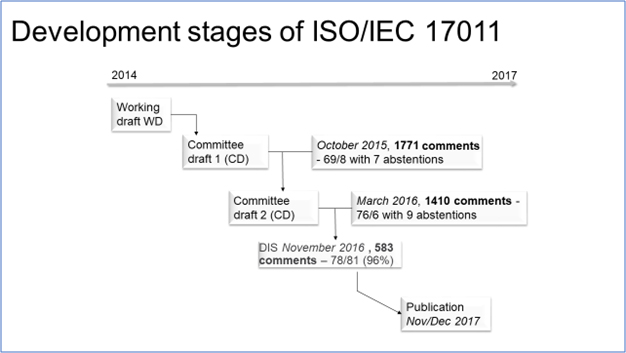From the Item Bank |
||
The Professional Testing Blog |
||
ISO/IEC 17011 – A Standard for Accreditation BodiesJanuary 26, 2018 | |The International Organization for Standardization (ISO) published an updated version of ISO/IEC 17011: Conformity assessment – Requirements for accreditation bodies accrediting conformity assessment bodies in December of 2017. This standard, as its name states, is a standard that specifies how accreditation bodies (such as the American National Standards Institute – ANSI) operate when accrediting certification bodies (also known as conformity assessment bodies). You might remember this standard from previous blog posts such as ISO, ANSI, IAF – Standards Soup. Making Sense out of a Bunch of Acronyms and Who Accredits the Accreditor?. ISO/IEC 17011 specifies the requirements for the competence, consistent operation and impartiality of accreditation bodies assessing and accrediting conformity assessment bodies. NOTE: In the context of this document, activities covered by accreditation include, but are not limited to, testing, calibration, inspection, certification of management systems, persons, products and services, provision of proficiency testing, production of reference materials, validation and verification. (ISO/IEC 17011, Clause 1. Scope). The development of standards is a lengthy process involving a number of experts from all over the world who volunteer their time at ISO Headquarters in Geneva, Switzerland several times a year and draft standards language. ISO Conformity Assessment Committee (CASCO) Working Group 42 was the working group that revised ISO/IEC 17011. There were over 75 participants from a number of countries who participated. WG 42 was chaired (Convened in ISO-Speak) by me, Dr. Cynthia Woodley who was nominated by ANSI and Mr. Alister Dalrymple from the French Accreditation Body (AFNOR). The standard was revised by the ISO CASCO WG42 over a period of three years and the following graphic depicts the standard development process.
The key issues associated with the revision include:
With the publication of the newly revised standard, accreditation bodies such as ANSI will have two years to implement the standard. A big part of this is making sure they have a process to evaluate and train the assessors that are conducting the accreditation assessments. To help in this effort, IAF has developed a document that lists the generic competence criteria for accreditation body assessors, which is available at Mandatory Document #20: Generic Competence for AB Assessors. After the implementation period, ANSI and other accreditation bodies will be peer evaluated to the new version of this standard by other accreditation bodies. During peer evaluation, ANSI will need to show that they are assessing the competence of their assessors according to ISO/IEC 17011 and IAF MD20. ISO CASCO will be posting a presentation on the new version of ISO/IEC 17011 that will highlight the changes to the standard from the previous version. That presentation will be posted to the ISO website. The PowerPoint presentations are now available to other ISO CASCO standards that have been updated, such as the updated version of ISO/IEC 17024. For more blogs related to accreditation check out ISO/IEC 17024 Implementation Around the World.
Categorized in: Industry News |
||



Comments are closed here.